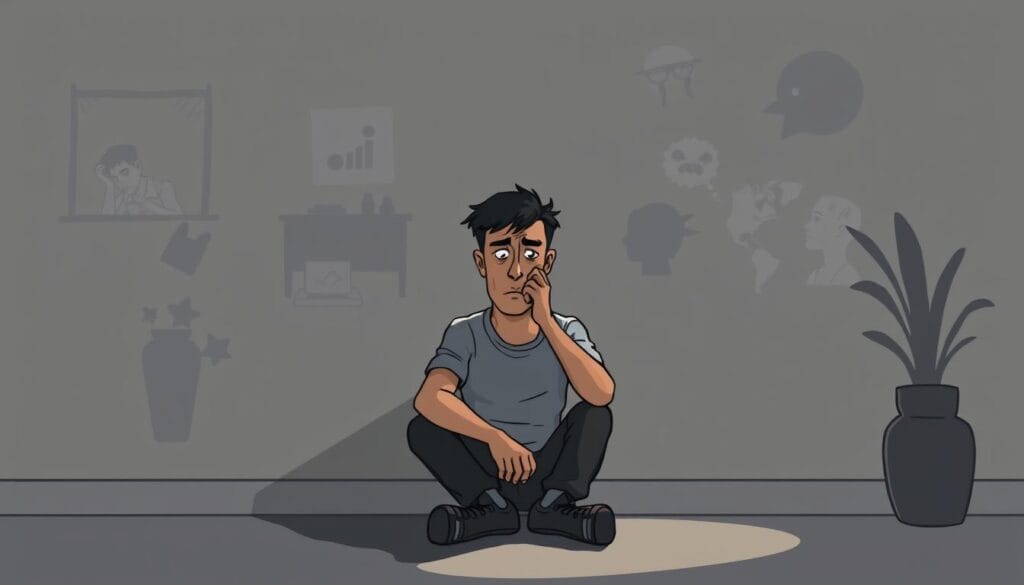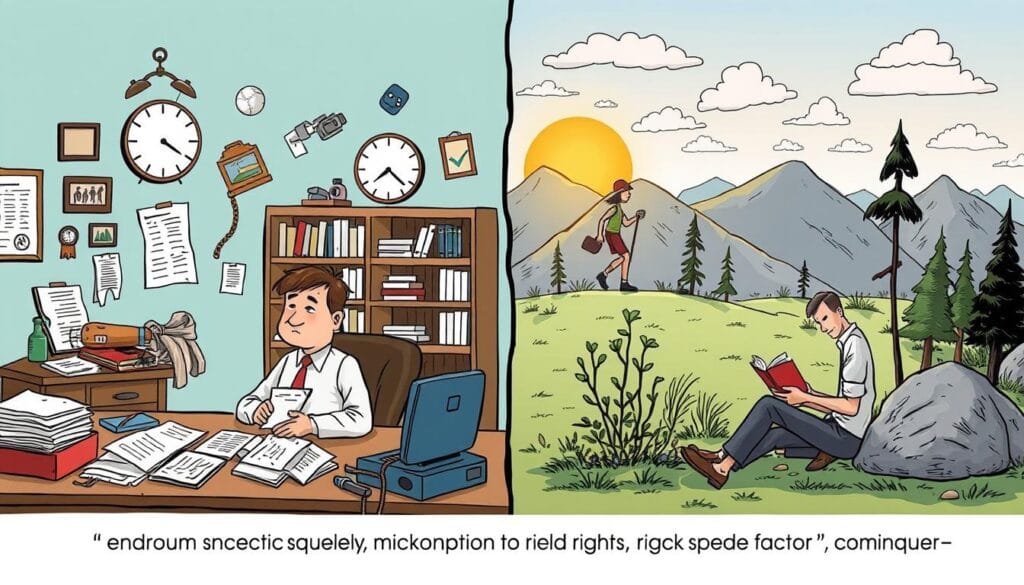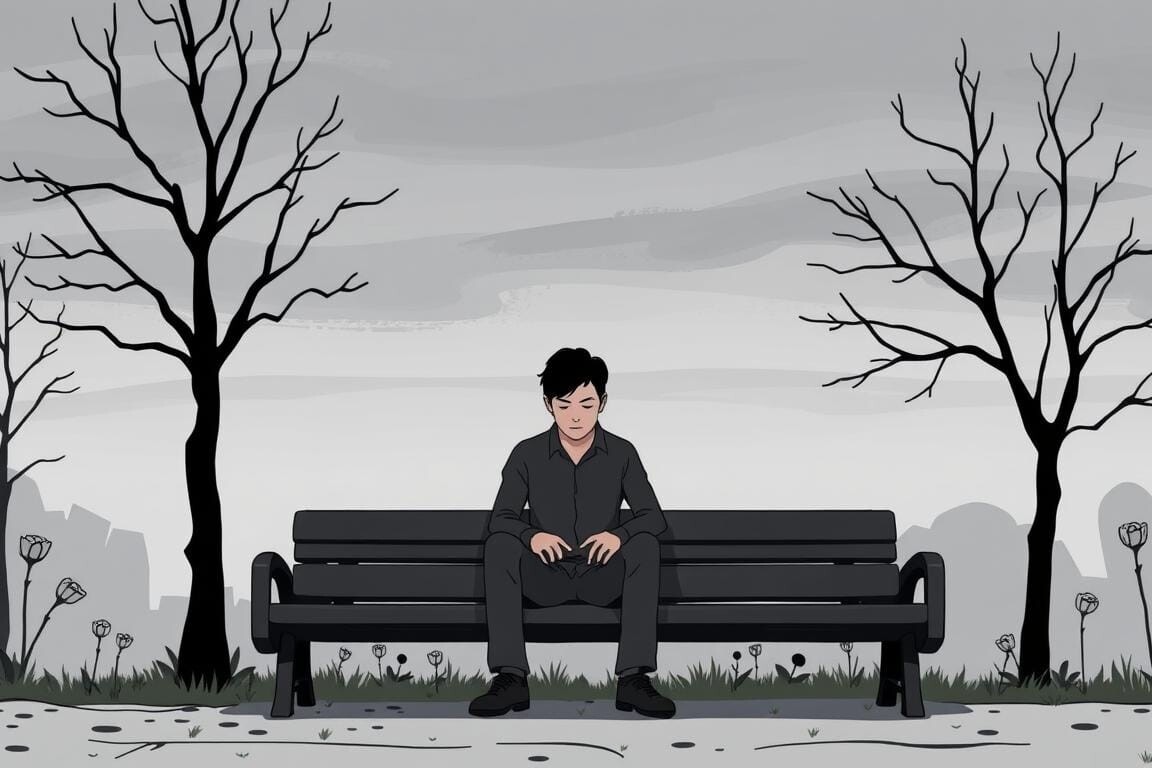Dr. Chandril Chugh is a top expert in men’s mental health. He knows how depression affects men’s lives. Women might face more mental health issues, but men struggle with depression too.
We will look at why men get depressed. We’ll find out what causes and triggers lead to depression in men.
Depression in men comes from many factors. Genetics, hormones, and brain chemicals can cause it. Also, big life events, tough relationships, and job stress can trigger it.
It’s important to know depression isn’t a weakness. It’s a treatable mental health issue. With the right help and support, men can fight depression and feel better.
Table of Contents
ToggleUnderstanding Social Anxiety Disorder
Social anxiety disorder is a common mental health issue. It can greatly affect a person’s life. It’s marked by a deep fear or anxiety in social settings, causing people to avoid these situations.
Knowing the symptoms and how common it is helps us understand and tackle this condition.
Symptoms and Manifestations
Social anxiety disorder usually starts in the teens, but it can begin in younger kids or adults too. People with this disorder often feel physical symptoms like blushing, a fast heartbeat, and sweating. They might also feel anxious or worried a lot.
They may find it hard to speak up or be themselves in social situations.
The Prevalence of Social Anxiety Disorder
- Lifetime prevalence rates of social anxiety disorder can be as high as 12%.
- Twelve-month prevalence rates have been reported as high as 7% in the United States.
- Social anxiety disorder is more common than major autoimmune conditions combined and is the third most common psychiatric condition after major depression and alcohol dependence.
- Women are somewhat more likely to have social anxiety disorder compared to men, and rates in children may increase slightly with age.
Social anxiety disorder can really hurt a person’s life. It can lead to low self-esteem, feeling isolated, and even substance abuse or thoughts of suicide. Recognizing the symptoms and how common it is is the first step to getting help.

Common Mental Health Challenges Faced by Men
Men’s mental health is a big issue that often gets ignored. Anxiety and depression hit men hard, but they show symptoms differently. Men might get angry, act out, or take risks instead of feeling sad or worried.
Anxiety and Depression: Higher Rates Among Men
Men are less likely to talk about their mental health. This can lead to serious problems in their lives. Sadly, men are more than 3.5 times more likely to die by suicide.
Trauma, Stress, and Post-Traumatic Stress Disorder
Experiencing trauma and stress can hurt men’s mental health. It can lead to PTSD and other issues. Men facing legal problems, financial stress, or discrimination are especially at risk.
Getting help from mental health experts can change a man’s life. It gives him tools to handle his feelings and solve problems. By helping men feel comfortable talking about their mental health, we can support everyone better.

Causes of depression in men
Depression is a complex condition that affects men too. The causes of depression in men are different from those in women. It’s important to understand these factors to help men with depression.
Hormonal imbalances, like changes in testosterone, can affect mood. Stress at work or in personal life can also lead to depression. These factors can make men feel hopeless and sad.
Social isolation and loneliness are big causes of depression in men. Men are often expected to be tough and independent. This can make it hard for them to form close relationships, worsening depression. 1
Physical health problems, like chronic pain or sexual issues, and traumatic events, like job loss or relationship breakups, also contribute to depression in men. 2,3
Depression in men has many causes, including biological, psychological, and social factors. Knowing these factors contributing to depression in men helps in supporting their mental health better.

- Depression affects 1 in 8 men at some point in their lives.
- 7 men die by suicide every day in Australia.
- Lonely individuals have an increased risk of developing depression.
- Men often report physical symptoms of depression like fatigue or weight loss, not emotional signs.
- Antidepressants and mood stabilizers take 4 to 6 weeks to work.
- Transcranial Magnetic Stimulation (TMS) helps by stimulating brain cells to control mood.
- Electroconvulsive Therapy (ECT) is used for severe depression that doesn’t respond to meds.
By understanding and addressing the unique causes of depression in men, we can help them overcome it. This improves their mental health and well-being.
References:
- American Psychological Association. (2019). Men and Depression. Retrieved from https://www.apa.org/topics/men-depression
- Harvard Health Publishing. (2020). What causes depression in men? Retrieved from https://www.health.harvard.edu/mind-and-mood/what-causes-depression-in-men
- Oliffe, J. L., & Phillips, M. J. (2008). Men, depression and masculinities: A review and recommendations. Journal of Men’s Health, 5(3), 194-202.
Gender-Specific Risk Factors and Stressors
Men’s mental health is unique. It’s shaped by societal expectations, relationships, and work-life balance. These factors can lead to mental health challenges.
Interpersonal Conflicts and Relationship Dynamics
Relationships can be a big stress for men. Conflicts with partners, family, or friends can harm their mental health. The need to keep up a certain image or follow traditional roles makes it hard for men to share their feelings.
Caregiving Responsibilities and Work-Life Balance
Work and personal life balance is tough for men. They often feel pressured to be the main earners, leading to more stress. Men who care for family members also face challenges in balancing work and family duties.

It’s important to tackle these unique challenges for men’s mental health. By understanding their struggles and offering specific support, we can help men take care of their well-being. This way, they can succeed in both their personal and professional lives.
Cultural and Ethnic Perspectives on Men’s Mental Health
Understanding men’s mental health needs a deep look at cultural and ethnic factors. These factors shape how men see and deal with their mental health. They are influenced by society and traditional beliefs.
In the United States, studies show depression is 50% more common in women than men. But, suicide rates are about three times higher in men. Groups like gay men, rural men, and divorced men face even bigger challenges.
Traditional masculinity norms can make men shy away from seeking help for mental health. They might think psychologists and psychiatrists are biased against them. This is seen not just in the United States but also in places like the Russian Federation.
It’s key to tackle these cultural and ethnic barriers to support men’s mental health. Policymakers and healthcare providers need to work together. They should create approaches that fit different communities.
By starting open conversations, challenging harmful gender stereotypes, and supporting mental health efforts for men, we can help. This way, men can focus on their mental health without fear of being judged or stigmatized.
The Impact of Discrimination and Gender-Based Violence
Discrimination and gender-based violence deeply affect men’s mental health. Feeling left out, low self-esteem, and stress are common. Gender-based violence can lead to PTSD, causing huge mental harm.
Studies show women face more mental health issues than men. Women are more likely to have anxiety and depression. Yet, men are more likely to die by suicide, even though women try more often.
Discrimination and violence hurt men’s mental health too. Many women face sexual assault, and most have been harassed. Women with disabilities are especially at risk.
We must tackle the mental health effects of these issues. We need to support and help those affected. By doing so, we can make a society that cares for everyone’s mental health, no matter their gender.
Addressing Mental Health Needs Across the Lifespan
It’s key to tackle men’s mental health across the lifespan at different life stages. Adolescent mental health in men is a big concern. Issues like body image and self-esteem can deeply affect their well-being. Over 1 in 5 youth (ages 13-18) have had a serious mental illness.
Adolescent Mental Health and Body Image Concerns
Adolescence is a time of big growth, both physically and emotionally. Men’s mental health is shaped by body image and self-perception. Around 15.1% of adults in America were diagnosed with mental illness in 2017. It’s vital to offer support and resources to young men.
Perinatal Mental Health and Postpartum Depression
Postpartum depression in men is often overlooked. While new moms get a lot of attention, dads face emotional challenges too. About 30.6% of men have experienced depression, and becoming a parent can be tough.
It’s important to focus on men’s mental health at all life stages. By understanding the challenges of adolescents and new dads, we can help. This way, we can make sure men’s mental health is a priority.
Strategies for Promoting Mental Well-Being in Men
Improving men’s mental health needs a mix of efforts. It’s important to raise awareness and teach about mental. This helps men feel okay to talk about their feelings without shame.
Community-based programs are also key. They offer support and resources made just for men. These programs help men feel connected and brave enough to ask for help.
It’s vital to create mental health plans that fit men’s needs. This means making tools and ways to talk that men can relate to. It helps men get the help they need and do better in treatment.
To really help men’s mental health, we must tackle big issues. Things like society’s expectations, unfair treatment, and lack of support play big roles. By tackling these, we can help men feel safe to talk about their feelings and get the help they need.
- Encourage open and honest conversations about mental health, destigmatizing the topic
- Promote self-care practices, such as stress management techniques and work-life balance
- Facilitate the development of strong support networks, both within communities and through professional help
- Advocate for increased funding and resources for gender-specific mental health programs and services
- Educate healthcare providers on the unique mental health needs and preferences of men
By using these strategies, we can help men feel strong enough to care for their mental health. And they’ll know it’s okay to ask for help to do well.
Conclusion
As we wrap up our look at men’s mental health, it’s clear we need to focus on men’s unique needs. We’ve learned a lot about depression and other mental health issues in men. We’ve seen how society’s expectations and stressors affect them.
We’ve also learned about the importance of treating symptoms in a way that fits men. While we’ve made progress in talking about mental health, there’s still a lot to do. We need to keep working to help men feel comfortable talking about their feelings.
By understanding and helping men, we can make a big difference. This means creating a safe space for them to talk about their mental health. It’s important to remember that mental health is key to overall well-being.
Everyone deserves to get the help they need to be happy and healthy. Let’s keep working to make sure men’s mental health is a priority. This way, we can all thrive in a supportive environment.
FAQ
What are the key causes and triggers of depression in men?
This article will look at why men often struggle with depression. We’ll talk about how hormones, stress, relationships, and society play a part. These factors can affect a man’s mood and well-being.
What is social anxiety disorder and how prevalent is it?
We’ll discuss social anxiety disorder and its common symptoms. It’s more common than you might think. We’ll also talk about how it affects people’s lives and why treatment is key.
What are the common mental health challenges that men face?
Men often deal with anxiety and depression more than women. Trauma, stress, and PTSD also play a big role. We’ll explore how society and culture add to these issues.
What are the specific causes and risk factors that contribute to depression in men?
We’ll dive into the reasons behind depression in men. Hormones, stress, relationships, and society all play a part. Understanding these factors can help men cope better.
What are the gender-specific risk factors and stressors that can contribute to mental health challenges in men?
We’ll look at how conflicts, relationships, and work-life balance affect men’s mental health. These issues can make mental health problems worse for men.
How do cultural and ethnic perspectives shape the understanding and experiences of mental health among men?
Cultural norms and beliefs can influence how men see and deal with mental health. We’ll explore how these can create barriers to seeking help.
What is the impact of discrimination and gender-based violence on the mental health of men?
Discrimination and violence can hurt men’s mental health. They can lead to feelings of shame, low self-worth, and stress. We’ll discuss how these can lead to PTSD.
How can we address the mental health needs of men at different stages of life?
We’ll talk about the unique challenges faced by boys and men at different ages. This includes body image issues and mental health during and after pregnancy.
What are the practical strategies and recommendations for promoting mental well-being in men?
We’ll share ways to improve men’s mental health. This includes self-care, stress management, building support networks, and seeking help when needed. It’s all about meeting men’s unique needs.
Source Links
About The Author

Medically reviewed by Dr. Chandril Chugh, MD, DM (Neurology)
Dr. Chandril Chugh is a U.S.-trained, board-certified neurologist with expertise in diagnosing and managing neurological disorders, including migraines, epilepsy, Parkinson’s disease, and movement disorders. His clinical focus includes evidence-based neurological care and patient education.
All content is reviewed for medical accuracy and aligned with current neurological guidelines.




